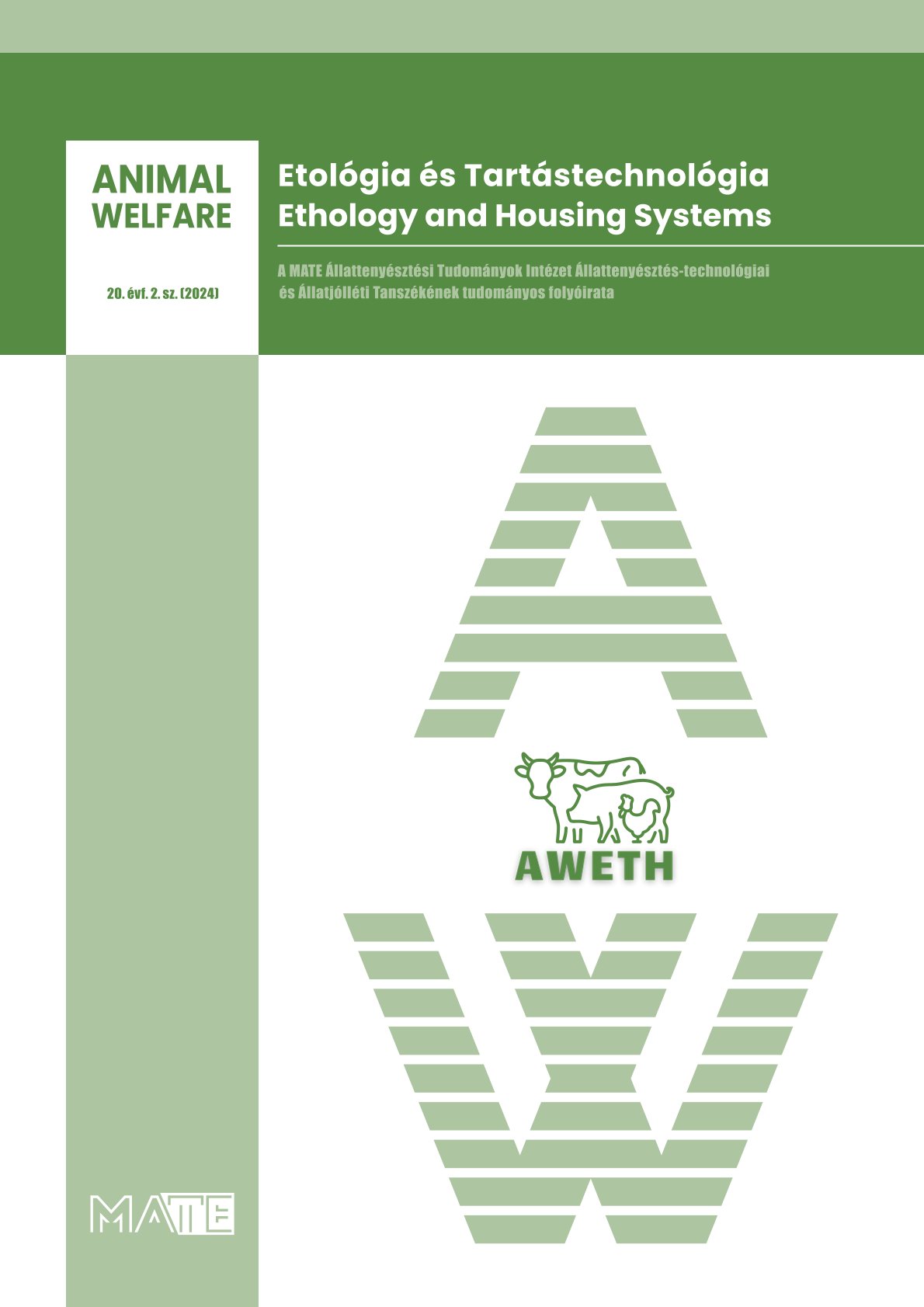Correlations of production factors in automated milking system in a Hungarian dairy farm
DOI:
https://doi.org/10.17205/aweth.6478Keywords:
milk yield, milking frequency, milking composition, automatic milking system (AMS), concentrateAbstract
Nowadays the use of automated milking systems (AMS) is increasingly popular as a technology that can reduce labor, increase milk production, and maximize profit. This study, which was carried out on a private dairy farm located in West Hungary, aimed to examine the relationship between AMS and production efficiency in lactating cows with herd sizes ranging from 267 to 322 Holstein-Friesian cows in the middle of lactation specifically 165 ± 10 days in milk. The result of this study indicates that on average, an AMS unit milked 49 ± 3 cows daily with each cow being milked 2.7 ± 0.1 times per day and producing a daily milk yield of 32.5 ± 1.3 kg per cow. The data was statistically analyzed using Pearson correlations and multiple linear regression analysis. The study found that daily milk yield was positively correlated with milking frequency (r = 0.61, p < 0.01) and negatively correlated with failed milkings (r = - 0.34, p < 0.01) but had no correlation with refusals (p > 0.05). As we expected, a positive correlation was observed between the amount of concentrate offered in AMS per cow per day and both milk yield (r = 0.52, p < 0.01) and milking frequency (r = 0.27, p < 0.01). Finally, the fat content was negatively correlated with daily milk yield (p < 0.05) and the amount of concentrate, however, there was no correlation observed for protein content with daily milk yield or the amount of concentrate in the AMS (p > 0.05). Detailed knowledge of these factors such as milking frequency and concentrate intake associated with increasing milk yield by using AMS will help guide future recommendations to producers for maximizing milk yield and decreasing the cost on dairy farms.
References
Abeni, F., Degano, L., Calza, F., Giangiacomo, R., Pirlo, G. (2005): Milk quality and automatic milking: Fat globule size, natural creaming, and lipolysis. Journal of Dairy Science, 88, 3519–3529. https://doi.org/10.3168/jds.S0022-0302(05)73037-X
Bach, A., Busto, I. (2005): Effects on milk yield of milking interval regularity and teat cup attachment failures with robotic milking systems. Journal of Dairy Research, 72, 101–106. https://doi.org/10.1017/S0022029904000585
Bach, A., Devant, M., Iglesias, C., Ferrer, A. (2009): Forced traffic in automatic milking systems effectively reduces the need to get cows but alters eating behavior and does not improve milk yield of dairy cattle. Journal of Dairy Science, 92, 1272–1280. https://doi.org/10.3168/jds.2008-1443
Bach, A., Iglesias, C., Calsamiglia, S., Devant, M. (2007): Effect of amount of concentrate offered in automatic milking systems on milking frequency, feeding behavior and milk production of dairy cattle consuming high amounts of corn silage. Journal of Dairy Science, 90, 5049–5055. https://doi.org/10.3168/jds.2007-0347
Boscaro, D., Pezzuolo, A., Grigolato, S., Cavalli, R., Marinello, F., Sartori L. (2015): Preliminary analysis on mowing and harvesting grass along riverbanks for the supply of anaerobic digestion plants in north-eastern Italy. Journal of Agricultural Engineering, 46(3), 100–104. https://doi.org/10.4081/jae.2015.465
Castro, A., Pereira, J. M., Amiama, C., Bueno, J. (2012): Estimating efficiency in automatic milking systems. Journal of Dairy Science, 95, 929–936. https://doi.org/10.3168/jds.2010-3912
Cogato, A., Brščić, M., Guo, H., Marinello, F., Pezzuo. A. (2021): Challenges and tendencies of automatic milking systems (AMS): A 20-year systematic review of literature and patents. Animals, 11(2), 356. https://doi.org/10.3390/ani11020356
De Koning, C.J.A.M., Rodenburg, J. (2004): Automatic milking: State of the art in Europe and North America, 25–37.
De Koning, K. (2010): Automatic milking—Common practice on dairy farms. Proc. Second North Am. Conf. Robotic Milking, Toronto, Canada, Precision Dairy Operators, Elora, Canada, V59–V63.
Dussault, M. (2001: Les systèmes de traite robotisée et leurs technologies. Symposium sur les bovins laitiers, CRAAQ https://www.agrireseau.net/bovinslaitiers/documents/2001_marcel_dussault.pdf.
Lencsés, E., Kovács, A., Dunay, A., Mészáros, K. (2007): Changes to the HACCP system in a dairy farm due to the installment of an automatic milking system. 16(6), 313–319. https://doi.org/10.22004/ag.econ.205906
Freiss, J. (2009) Évolution de la qualité du lait lors de l’installation d’un robot de traite : description et facteurs de variation.Thèse Doct., École nationale vétérinaire de Nantes, pp 214.
Friggens, N. C., Rasmussen, M. D. (2001): Milk quality assessment in automatic milking systems: Accounting for the effects of variable intervals between milkings on milk composition. Livestock Production Science, 73, 45–54. https://doi.org/10.1016/S0301-6226(01)00228-7
Gustavsson, A. (2010): Automatiska Mjölkningssystem - Så Påverkas Arbetstid Och Arbetsmiljö. JTI informerar, No. 124, JTI - Institutet för jordbruks- och miljöteknik.
Gygax, L., Neuffer, I., Kaufmann, C., Hauser, R., Wechsler, B. (2007): Comparison of Functional Aspects in Two Automatic Milking Systems and Auto-Tandem Milking Parlors. Journal of Dairy Science, 90, 4265–4274. https://doi.org/10.3168/jds.2007-0126
Halachmi, I., S. Ofir, Miron. J. (2005): Comparing two concentrate allowances in an automatic milking system. Animal Science, 80, 339–344. https://doi.org/10.1079/ASC40480339
Hansen, B.G. (2015): Robotic milking-farmer experiences and adoption rate in Jæren, Norway. Journal of Rural Studies. 41, 109–117. https://doi.org/10.1016/j.jrurstud.2015.08.004
Hansen, B.G., Herje, H.O., Höva, J. (2019): Profitability on dairy farms with automatic milking systems compared to farms with conventional milking systems. International Food and Agribusiness Management Review, 22, 215–228. https://doi.org/10.22434/IFAMR2018.0028
Hansen, B.G., Stræte. E.P. (2020): Dairy farmers' job satisfaction and the influence of automatic milking systems. NJAS - Wageningen Journal of Life Science, 92, 100328. https://doi.org/10.1016/j.njas.2020.100328
Hare, K., DeVries, T., Schwartkopf-Genswein, K., Penner, G.B. (2018): Does the location of concentrate provision affect voluntary visits, and milk and milk component yield for cows in an automated milking system? Canadian Journal of Animal Science, 98, 399–410. https://doi.org/10.1139/cjas-2017-0123
Hårstad, R.M.B. (2019): Bonden, familien og melkeroboten – en ny hverdag. Research report. https://hdl.handle.net/11250/3013496 (last assessment: 30 August 2024)
Henriksen, C.S., Munksgaard, L., Weisbjerg, M.R. (2018): Short-term responses in production and behavior during periods of change in concentrate allowance for dairy cows. Journal of Dairy Science, 101, 7942–7953. https://doi.org/10.3168/jds.2018-14624
Hogeveen, H., Steenveld, W. (2013): Integrating it all: Making it work and pay at the farmProc. Precision Dairy 2013, University of Minnesota, Rochester, MN. St. Paul, pp. 113–121.
Hopster, H., Bruckmaier, R. M., Van der Werf, J. T. N., Korte, S. M., Macuhova, J., Korte-Bouws, G., van Reenen, C.G. (2002): Stress responses during milking: Comparing conventional and automatic milking in primiparous dairy cows. Journal of Dairy Science, 85, 3206–3216. https://doi.org/10.3168/jds.S0022-0302(02)74409-3
Hovinen, M., Pyörälä, S. (2011): Invited review: Udder health of dairy cows in automatic milking. Journal of Dairy Science, 94, 547–562. https://doi.org/10.3168/jds.2010-3556
Jacobs, J., Siegford, J. (2012): The impact of automatic milking systems on dairy cow management, behavior, health, and welfare. Journal of Dairy Science, 95, 2227–2247. https://doi.org/10.3168/jds.2011-4943
Knight, C.H., Peaker, M., Wilde, C.J. (1998): Local control of mammary development and function. Review of Reproduction, 3, 104–112.
Lessire, F., Moula, N., Hornick, J., Dufrasne, I. (2020): Systematic review and meta-analysis: Identification of factors influencing the milking frequency of cows in automatic milking systems combined with grazing. Animals, 10, 913. https://doi.org/10.3390/ani10050913
Madsen, J., Weisbjerg, M. R., Hvelplund. T., (2010): Concentrate composition for automatic milking systems —Effect on milking frequency. Livestock Science, 127,45–50. https://doi.org/10.1016/j.livsci.2009.08.005
Marcos, L., Filho, S., Lopes, M.A., Brito, S.C., Rossi, G., Conti L., Barbari, M. (2020): Robotic milking of dairy cows: A review. Semina Ciências Agrárias, 41, 2833–2850. https://doi.org/10.5433/1679-0359.2020v41n6p2833
Marques, T.C., Lage, C.F.A., Bruno, D.R., Fausak, E.D., Endres, M.I., Ferreira, F.C., & Lima, F.S. (2023). Geographical trends for automatic milking systems research in non-pasture-based dairy farms: A scoping review. Journal of Dairy Science, 106, 7725–7736. https://doi.org/10.3168/jds.2023-23313
McKinsey Global Institute. (2017): A future that works: Automation, employment, and productivity. Future-that-works-Executive-summary. Accessed 3rd May 2021.
Melin, M., Svennersten-Sjaunja, K., Wiktorsson, H. (2005): Feeding patterns and performance of cows in controlled cow traffic in automatic milking systems. Journal of Dairy Science, 88, 3913–3922. https://doi.org/10.3168/jds.S0022-0302(05)73077-0
Menajovsky, S.B., Walpole C.E., DeVries, K.S. Schwartzkopf-Genswein, M.E. Walpole, G.B. Penner (2018): The effect of the forage-to-concentrate ratio of the partial mixed ration and the quantity of concentrate in an automatic milking system for lactating Holstein cows. Journal of Dairy Science, 101, 9941–9953. https://doi.org/10.3168/jds.2018-14665
Nixon, M., Bohmanova, J., Jamrozik, J., Schaeffer, L.R., Hand, K., Miglior, F. (2009): Genetic parameters of milking frequency and milk production traits in Canadian Holsteins milked by an automated milking system. Journal of Dairy Science, 92, 3422–3430. https://doi.org/10.3168/jds.2008-1689
Piwczyński, D., Brzozowski, M., Sitkowska B. (2020): The impact of the installation of an automatic milking system on female fertility traits in Holstein-Friesian cows. Livestock Science, 240, 104140. https://doi.org/10.1016/j.livsci.2020.104140
Probo, M., Pascottini, O.B., LeBlanc,S., Opsomer, G., Hostens,M. (2018): Association between metabolic diseases and the culling risk of high-yielding dairy cows in a transition management facility using survival and decision tree analysis. Journal of Dairy Science, 101, 9419–9429. https://doi.org/10.3168/jds.2018-14422
Rodenburg, J. Kelton, D.F. (2001): Automatic Milking Systems in North America: Issues and Challenges Unique to Ontario, Proc. of the 40th Ann. Mtg. of the National Mastitis Council, pp 162.
Schewe, R., Stuart, D. (2015): Diversity in agricultural technology adoption: How are automatic milking systems used and to what end? Agriculture and Human Values, 32, 199–213. https://doi.org/10.1007/s10460-014-9542-2
Simões Filho, L.M., Lopes, M.A., Brito, S.C., Rossi, G., Conti, L., Barbari,M. (2020): Robotic milking of dairy cows: A review. Semina Ciencas Agrárias, 41, 2833–2850. https://doi.org/10.5433/1679-0359.2020v41n6p2833
Svennersten-Sjaunja, K.M., Pettersson, G. (2008): Pros and cons of automatic milking in Europe. Jornal of Animal Science, 86, 37–46. https://doi.org/10.2527/jas.2007-0527
Szendrei, Z., Sós, Sz. (2010): Robotfejés a gyakorlatban – az első fél év tapasztalatai. Holstein Magazin, 18, 60–62.
Tse, C., Barkema, H. W., DeVries, T. J., Rushen, J., Pajor, E. A. (2018): Impact of automatic milking systems on dairy cattle producers’ reports of milking labor management, milk production, and milk quality. Animal, 12, 2649–2656. https://doi.org/10.1017/S1751731118000654
Unal, H., Kuraloglu, H. (2015): Determination of operating parameters in milking robots with free cow traffic. Engineering for Rural Development, 14, 234–240.
Van Breukelen, A.E., Aldridge, M.N., Veerkamp, R.F., Koning, L., Sebek, L.B., de Haas Y. (2023): Heritability and genetic correlations between enteric methane production and concentration recorded by GreenFeed and sniffers on dairy cows. Journal of Dairy Science, 106, 4121–4132. https://doi.org/10.3168/jds.2022-22735
Wright, J.B., Wall, E.H., Mcfadden, T.B. (2013): Effects of increased milking frequency during early lactation on milk yield and udder health of primiparous Holstein heifers. Journal of Animal Science, 91, 195–202. https://doi.org/10.2527/jas.2012-5692
Downloads
Published
Issue
Section
License
Copyright (c) 2024 Nawel Hlel, Gabriella Holló, Bence Bus, Ágnes Süli, Zsófia Nyúl, Miklós Gábor Szabari

This work is licensed under a Creative Commons Attribution-NonCommercial-NoDerivatives 4.0 International License.
The journal operates according to the principles of open access, however, the content is available under the Creative Commons 4.0 standard licenc: CC-BY-NC-ND-4.0. Under the following terms: You must give appropriate credit, provide a link to the license, and indicate if changes were made. You may do so in any reasonable manner, but not in any way that suggests the licensor endorses you or your use. You may not use the material for commercial purposes. If you remix, transform, or build upon the material, you may not distribute the modified material. You may not apply legal terms or technological measures that legally restrict others from doing anything the license permits.














